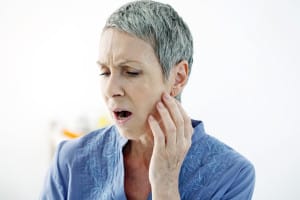 TMJ disorder and bruxism are common dental disorders affecting your TMJ, also known as the temporomandibular joint. Your temporomandibular joints are the joints that connect your jaw to the rest of your skull; they act as hinges as your mouth opens and closes. Your jaw joints are at work countless times throughout the day, though you may not notice until you experience jaw discomfort. Jaw soreness is often a sign of TMJ disorder or bruxism. Do you have bruxism or TMJ disorder? These disorders need to be treated before they cause damage to your joints, teeth, and overall health.
TMJ disorder and bruxism are common dental disorders affecting your TMJ, also known as the temporomandibular joint. Your temporomandibular joints are the joints that connect your jaw to the rest of your skull; they act as hinges as your mouth opens and closes. Your jaw joints are at work countless times throughout the day, though you may not notice until you experience jaw discomfort. Jaw soreness is often a sign of TMJ disorder or bruxism. Do you have bruxism or TMJ disorder? These disorders need to be treated before they cause damage to your joints, teeth, and overall health.
Quiz: Do You Have Bruxism or TMJ Disorder?
1. You often wake up with a sore jaw.
a. True
b. False
2. You have experienced the following symptom:
a. A popping or click noise with your jaw
b. A dry mouth
c. Swollen gums
3. When stressed or experiencing anxiety, you find yourself clenching your teeth or experiencing tightness in your jaw.
a. True
b. False
4. You have worn teeth surfaces or uneven wear on the chewing surfaces of your teeth.
a. True
b. False
5. You have experienced the following discomfort in recent months:
a. Pain radiating through your face, head and neck
b. Sore, inflamed gum tissue
c. Persistent toothache
Mostly As? Time to Visit Your Dentist
If you answered As for any of the above questions, then it’s important to schedule a check-up visit with your dentist, because you’re experiencing one or more of the telltale symptoms of bruxism or TMJ disorder. What is bruxism? Bruxism is involuntarily teeth grinding, typically done while you sleep. Many patients have this habit unbeknownst to them, and it is only until they notice symptoms of the disorder that they seek consultation with a dentist. Bruxism causes stress to the jaw in addition to damaging the teeth, so it’s a harmful habit that needs to be corrected to prevent damage to your dental health. Bruxism can be treated with a bruxism appliance, such as a mouth guard or splint. Bruxism mouth guards are worn while you sleep to protect teeth from damage and minimize grinding. TMJ disorder is the dysfunction of the jaw joints, and this condition results in pain that radiates beyond the jaw muscles to cause discomfort in the neck and head. TMJ disorder treatment includes mouth guards, medication, stress relief, dental work to correct misalignment, and the revolutionary TruDenta system.


